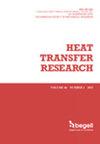Study on the Influence of Multi-Frequency Noise on the Combustion Characteristics of Pool Fires in Ship Engine Rooms
IF 1.6
4区 工程技术
Q3 THERMODYNAMICS
引用次数: 0
Abstract
A large amount of low- and medium-frequency noise can be found in the engine room of a ship. However, during the development of a fire, vibrations of the air in the engine room at different frequencies can be caused by noise disturbances, and the flow field distribution in the flame zone will be changed, which will affect the combustion characteristics of the pool fire. In this paper, a n-heptane pool with a diameter of 6 cm in a confined space of 1500 mm×1500 mm×1000 mm is used. The effects of noise of 75 dB, 90 dB, 105 dB, and 112 dB at 250 Hz, 700 Hz, and 1000 Hz and the noise of the engine room on the combustion behaviour of the pool fire are studied experimentally. By analysing the variation in fuel mass, flame height, and flame tilt, the results show that the multi-frequency noise significantly affects the combustion characteristics of the pool fire in a confined space. Under the perturbation of noise waves, the mass loss rate of the pool is larger than that of the pool fire when it burns freely, and the mass loss rate is exponentially nonlinearly related to the noise pressure. In general, the flame height gradually decreases with an increasing noise pressure in the engine room. Additionally, a new coupling relationship between the flame height and the noise pressure is established based on the noise motion equation, and it is found that there is a negative exponential between the noise pressure and the flame height. In addition, the flame can tilt under the action of the air particle displacement caused by the noise of the engine room. The noise pressure field formed in the confined space has a restraining effect on the pool fire, and the flame tilt angle gradual多频噪声对轮机舱池火燃烧特性的影响研究
船舶机舱内存在大量中低频噪声。然而,在火灾发展过程中,机舱内的空气会因噪声干扰而产生不同频率的振动,火焰区的流场分布也会发生变化,从而影响池火的燃烧特性。本文在 1500 mm×1500 mm×1000 mm 的密闭空间中使用了直径为 6 cm 的正庚烷池。实验研究了频率分别为 250 Hz、700 Hz 和 1000 Hz 的 75 dB、90 dB、105 dB 和 112 dB 的噪声以及机房噪声对池火燃烧行为的影响。通过分析燃料质量、火焰高度和火焰倾斜度的变化,结果表明多频噪声对密闭空间中池塘火的燃烧特性有显著影响。在噪声波的扰动下,池火的质量损失率大于自由燃烧时的质量损失率,且质量损失率与噪声压力呈指数非线性关系。一般来说,机房内的火焰高度会随着噪声压力的增加而逐渐降低。此外,还根据噪声运动方程建立了火焰高度与噪声压力之间的新耦合关系,发现噪声压力与火焰高度之间存在负指数关系。此外,在机房噪声引起的空气粒子位移作用下,火焰会发生倾斜。密闭空间内形成的噪声压力场对池火有抑制作用,火焰倾斜角逐渐减小。
本文章由计算机程序翻译,如有差异,请以英文原文为准。
求助全文
约1分钟内获得全文
求助全文
来源期刊

Heat Transfer Research
工程技术-热力学
CiteScore
3.10
自引率
23.50%
发文量
102
审稿时长
13.2 months
期刊介绍:
Heat Transfer Research (ISSN1064-2285) presents archived theoretical, applied, and experimental papers selected globally. Selected papers from technical conference proceedings and academic laboratory reports are also published. Papers are selected and reviewed by a group of expert associate editors, guided by a distinguished advisory board, and represent the best of current work in the field. Heat Transfer Research is published under an exclusive license to Begell House, Inc., in full compliance with the International Copyright Convention. Subjects covered in Heat Transfer Research encompass the entire field of heat transfer and relevant areas of fluid dynamics, including conduction, convection and radiation, phase change phenomena including boiling and solidification, heat exchanger design and testing, heat transfer in nuclear reactors, mass transfer, geothermal heat recovery, multi-scale heat transfer, heat and mass transfer in alternative energy systems, and thermophysical properties of materials.
 求助内容:
求助内容: 应助结果提醒方式:
应助结果提醒方式:


